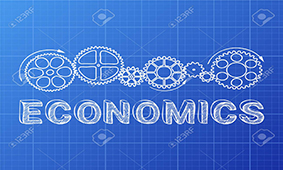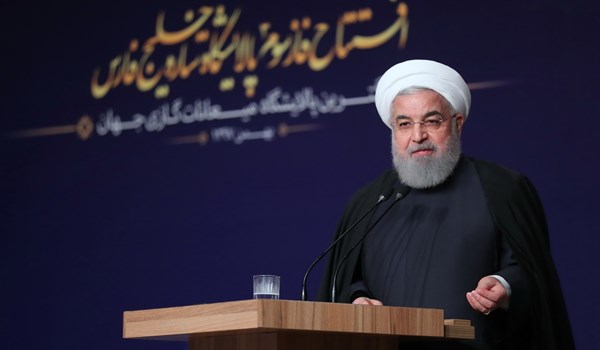
President Rouhani Calls for Knowledge-Based Economy


“Knowledge-based services and companies have a huge capacity for employment,” Rouhani said, addressing a meeting of senior officials at the Ministry of Cooperatives, Labor and Social Welfare on Monday morning in Tehran.
He continued, adding that such enterprises have had billions of dollars of income in 2017, and created over 300,000 jobs in the same year.
“Although we are under sanctions, helping resolve people’s problems, especially employees, is our duty,” the head of government underlined.
He urged the need to promote non-oil sectors saying, “Entrepreneurship should focus on non-oil exports.”
Rouhani also highlighted the importance of boosting the quality of domestic brands and goods as something that could help regain people’s confidence and promote employment in the society.
“Unemployment is the main cause of social problems and creating jobs is a national responsibility," the president said, stressing that production of high-quality brands would be a great approach to gain people’s confidence and help create more jobs.
“A worker and an engineer who work well create social confidence and vitality.”
Rouhani stressed that “building confidence between the employer and the employee is one of the most important missions of the labor ministry”.
Stating that the employment rates during his presidency have increased to 24 million people from 20.6 million, he said the government is still far from its envisaged plans.
On Saturday, Rouhani said that the US’ unilateral sanctions against Tehran have helped his country as the pressures push the nation to work harder and replicate embargoed products and items.
“Some countries think that sanctions are a way for reducing the pace of development in a country; but, they increase motivation for us in the country, so that we can produce the part we used to import,” Rouhani said, on Saturday in a meeting with heads of knowledge-based companies and startups in Tehran.
The Iranian president described working towards self-sufficiency as a practical fight against imperialism and major powers, adding, “Sanctions are aimed at reducing the growth of technology in our country … but we need to use sanctions as an opportunity for growth.”
Rouhani said that countries which build walls around themselves will be destroyed from inside and will achieve no progress.
Pointing to Trump’s administration insistence on building physical walls along its Southern borders, Rouhani said, “They do not know that all their progresses were because of the fact that there existed no walls for many years.”
If there is any growth and progress in the United States, it is because of the presence of different nationalities in the country, he highlighted.
Rouhani described freedom of thought as the most important infrastructure for progress in science, society and politics, adding, “We believe that development in science and technology happens under freedom.”
Appreciating the work of knowledge-based enterprises and Presidential Deputy for Science and Technology, Rouhani said, “In the past 5 years, very good work has been done in science and technology.”
“One of the responsibilities of the government is facilitating communication with the world,” he continued, adding, “We need to have close relations with different intellectuals from different countries.”
Rouhani also went on to say, “Every new technology that is built inside the country has to be exported after supplying the domestic demands.”
He also said, “We need to help knowledge enterprises in different fields such as insurance, tax, loans and other fields to achieve our desired result.”
Late in January, Iran’s Economy Minister Farhad Dejpasand said the country’s trade balance has improved in the last 10 months of the current Iranian calendar year (started on March 21, 2018), boasting that the plots to cut the country’s oil revenues to zero have failed.
Dejpasand said that Iran’s non-oil exports had increased over the ten months up to January 20 and 85 percent of its imports pertain to raw materials.
Addressing a gathering of Hormuzgan province’s business persons and investors, the minister said the enemies were unable to lower Iran’s oil exports down to zero, as the oil sales continue as before.


Trump weighs using $2 billion in CHIPS Act funding for critical minerals

Codelco cuts 2025 copper forecast after El Teniente mine collapse

Electra converts debt, launches $30M raise to jumpstart stalled cobalt refinery

Barrick’s Reko Diq in line for $410M ADB backing

Abcourt readies Sleeping Giant mill to pour first gold since 2014

Nevada army depot to serve as base for first US strategic minerals stockpile

SQM boosts lithium supply plans as prices flick higher

Viridis unveils 200Mt initial reserve for Brazil rare earth project

Tailings could meet much of US critical mineral demand – study

Kyrgyzstan kicks off underground gold mining at Kumtor

Kyrgyzstan kicks off underground gold mining at Kumtor

KoBold Metals granted lithium exploration rights in Congo

Freeport Indonesia to wrap up Gresik plant repairs by early September

Energy Fuels soars on Vulcan Elements partnership

Northern Dynasty sticks to proposal in battle to lift Pebble mine veto

Giustra-backed mining firm teams up with informal miners in Colombia

Critical Metals signs agreement to supply rare earth to US government-funded facility

China extends rare earth controls to imported material

Galan Lithium proceeds with $13M financing for Argentina project

Kyrgyzstan kicks off underground gold mining at Kumtor

Freeport Indonesia to wrap up Gresik plant repairs by early September

Energy Fuels soars on Vulcan Elements partnership

Northern Dynasty sticks to proposal in battle to lift Pebble mine veto

Giustra-backed mining firm teams up with informal miners in Colombia

Critical Metals signs agreement to supply rare earth to US government-funded facility

China extends rare earth controls to imported material

Galan Lithium proceeds with $13M financing for Argentina project

Silver price touches $39 as market weighs rate cut outlook

















